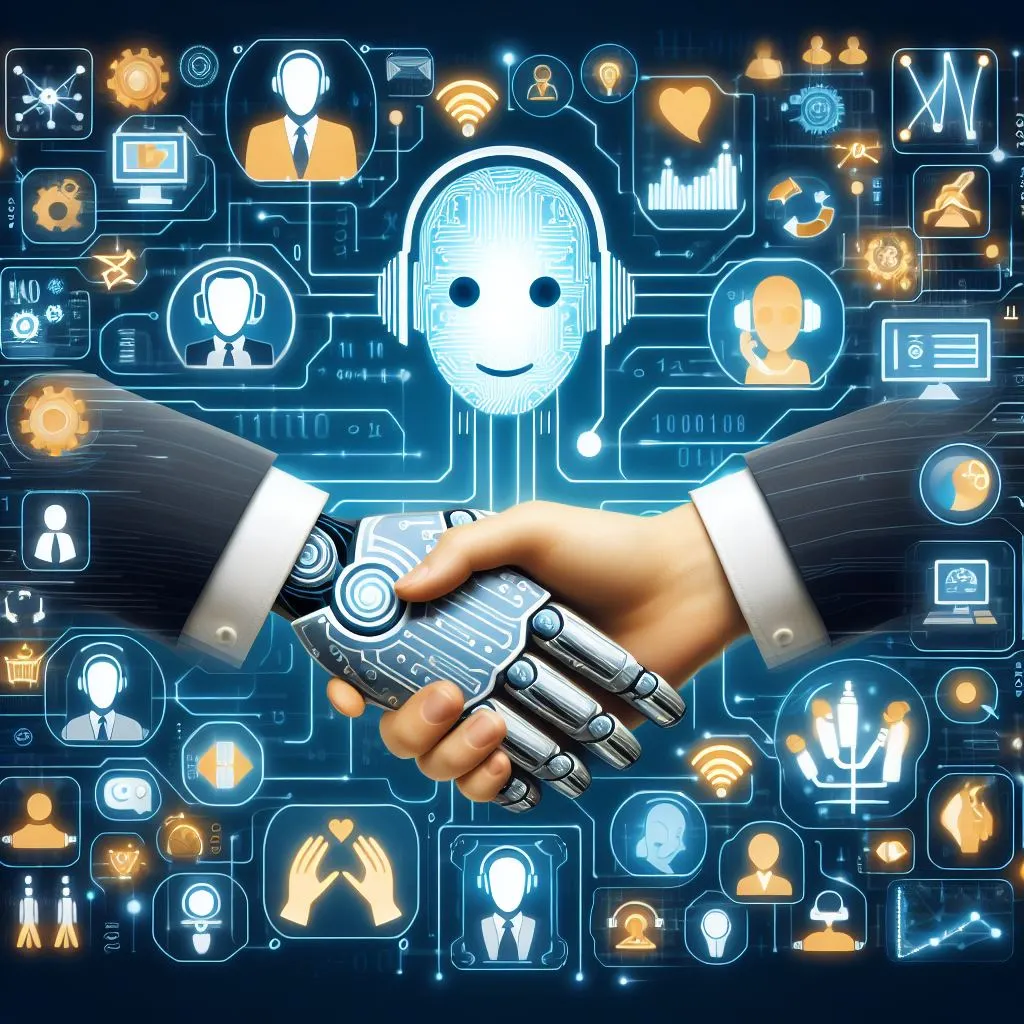The emergence of artificial intelligence (AI) has generated discussions over its potential to transform several businesses in the rapidly evolving field of technology. Customer service is one sector that has seen tremendous change. AI-powered chatbots have become a viable substitute for human customer support professionals and are gaining traction more quickly than ever. Proponents of AI claim that technology can transform customer service, while skeptics point out that depending only on AI has limits and downsides. Yet, as we delve more into this budding narrative, it becomes evident that the interaction between AI chatbots and human representatives is less of a competition for attention and more of a delicate duet.
Let’s look at some of the Pros of AI Chatbots:
- 24/7 Availability: The indisputable advantages of AI chatbots are portrayed in the act of this technical drama. Imagine a flawless, round-the-clock service where clients can get prompt answers to their questions at any time of day. The AI chatbot is a relentless worker that is very skilled at efficiency. Chatbots are more accessible and responsive than human representatives because they may answer to client inquiries at any time, unlike human representatives who have set working hours. This feature allows chatbots to accommodate consumers with diverse schedules or in different time zones. Routine, mundane questions take on a virtuoso quality, freeing up human agents to concentrate on the most complex facets of consumer interaction.
- Efficiency and Speed: AI chatbot proponents frequently emphasize how well they handle a huge volume of simple, repetitive activities, which enables them to respond to frequently asked client questions with precision and speed. Because chatbots don’t get tired as people do, they can provide consistent, high-quality service all day long. This effectiveness may lead to more rapid resolution of problems, which will increase customer satisfaction and loyalty. Freshworks conducted a survey regarding this which can be read further here: [ https://textexpander.com/blog/will-customer-support-ai-replace-human-agents]
- Cost Effectiveness and Scalability: The affordability of AI chatbots is a significant advantage from a business standpoint. Compared to the continuous expenditures of salary, training, and other human resource expenses associated with keeping a team of customer support professionals, chatbots require less money once they are built and put into use. Companies rejoice in the cost-effectiveness of this digital talent as AI chatbots take center stage in a performance where time is of the essence. An initial investment in AI has the potential to replace a battalion of human representatives, saving both money and time. Furthermore, chatbots are simple to scale up to handle a rising amount of client inquiries, giving businesses the flexibility to keep up with demand. For more supportive reading: [https://3ccontactservices.com/will-chatbots-replace-live-agents-in-customer-support/]
Now let us look at some considerations and cons of AI Chatbots:
- The Human Touch: It becomes clear that AI chatbots struggle in the emotional intricacies of customer support. Here comes the human proxies, the seasoned emotional intelligence and empathy players. Here, agents skillfully handle the delicate nuances of clients’ emotions, demonstrating the value of human touch and offering a degree of comprehension that AI chatbots find difficult to match. When dealing with complicated problems or sensitive concerns, customers frequently look for certainty, compassion, and a tailored response. Human agents may perform better than chatbots when managing emotionally charged scenarios or situations that call for empathy. This makes the human touch irreplaceable in customer service. For more information, Read here [https://www.linkedin.com/pulse/chatbots-replace-customer-service-representatives-miclient/]
- Complex Problem-Solving and Adaptability: Although AI excels at everyday activities, it may find it difficult to solve complicated problems that need for a sophisticated knowledge or original problem-solving techniques. AI chatbots now lack the ability to solve complicated problems and adapt, which is a skill that customer support personnel possess. Human delegates are able to handle challenging conditions and adjust to unanticipated events. They are able to offer customized solutions, particularly where a thorough comprehension of the demands of the client is essential. Human agents are equally capable of using judgment, navigating ambiguous circumstances, and customizing solutions to fit the demands of each particular client. AI systems find it difficult to be as flexible as this since they are limited by pre-programmed algorithms.
- Building Relationships: Certain clients might want interpersonal interaction, particularly when handling delicate or complex issues. A total switch to AI chatbots can make some customers discontented. A crucial component of providing excellent customer service is building deep relationships with clients. Long-term client loyalty may be fostered by human representatives’ ability to establish rapport, comprehend individual preferences, and provide a more personalized experience.
- Initial Setup and Maintenance Costs: AI chatbot implementation necessitates a large initial investment in infrastructure and technology. The system must also receive regular upgrades and maintenance in order to remain updated and functional.
The harmony between AI chatbots and human representatives is a dynamic work of art that is always changing. AI chatbots’ remarks will continue to be refined by technological breakthroughs, expanding their capabilities as human interaction adjusts to match. To find the ideal balance between AI and human engagement that aligns with their brand values and customer service goals, businesses must carefully evaluate their own requirements and customer expectations.
The efficiency, affordability, and scalability of AI chatbots are indisputable; nonetheless, the complexity and flexibility of human emotions continue to be a difficulty. A thoughtful combination of AI and human customer care agents could be the best course of action rather than an either-or choice. Envision a disgruntled client navigating the intricate maze of a complicated problem. Here, the human representative takes on a heroic role, equipped with the capacity to solve problems and adjust to changing conditions. The complexities of human emotion are like a complicated melody, and the human touch is the essential conductor in this symphony.
In order to provide customers with a smooth and customized experience in the digital age, customer service is changing, necessitating a balanced strategy that makes use of both AI and human skills. Additionally, keep track of feedback from customers and AI chatbot performance to make appropriate improvements. The best of both worlds should be provided by a well-considered combination of AI and human components in customer service, exceeding consumer expectations and upholding a high standard of service quality.

